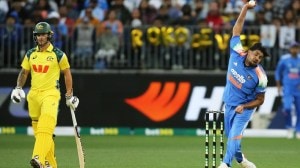The good news from Kashmir
It is time to step back a little from the hectic exchanges between India and Pakistan on the latest peace proposals and the Centre’s of...

It is time to step back a little from the hectic exchanges between India and Pakistan on the latest peace proposals and the Centre’s offer to talk to the Hurriyat, so that we don’t miss the big picture. The last year has seen all players in J&K take steps beyond their rigidly held positions. The most fascinating development in Kashmir today is the emergence of a new, young leadership, of a kind that does not exist in any other state. These are men and women in their thirties and forties, cutting across parties and shades of opinion. They are charismatic and poised to lead the state in the years to come.
There is Mehbooba Mufti, chief of the People’s Democratic Party, who is a new star, empathising with the pain of her people, identifying with their aspirations. There is Finance Minister Muzzaffar Beig, in his mid fifties, who may not be charismatic but whose exceptional intellectual capabilities and sense of balance will take him places. He is a comparative newcomer to politics ,joing the PDP after it was formed.
On the other side of the fence is Omar Abdullah who heads the National Conference; the baton of the Abdullah dynasty has been passed on to him. Omar is the true inheritor of Sheikh Saheb’s legacy, his grandmother had declared just before she died. Though the NC’s leadership is inextricably tied to the Abdullah family, several other promising leaders have emerged like Chaudhury Ramzan, Ali Mohammed Sagar and Mian Altaf, who is a Gujjar. There is Hardev Singh in Bhim Singh’s Panther party, and Sajjad Lone has come a long way after his father’s assassination.Among the separatists, there is Mirwaiz Omar Farooq, Yasin Malik, who with his pro-azadi slogan turned the movement against Pakistan, and Shabir Shah.
Crisis and suffering have played a role in fashioning a new leadership. These are leaders who in their own way want a governance that is radically different from what prevailed in the regime of either Sheikh Abdullah, Bakshi Ghulam Mohammed or even Farooq Abdullah. Curiously, the two mainstream parties, the Congress and BJP, have not thrown up a younger leadership in quite the same way.
As far as the present leadership is concerned, Mufti Mohammed Sayeed has come a long way from the Home Minister of 1990 or the Pradesh Congress Committee chief of the early eighties, the Centre’s hatchet man to replace Farooq Abdullah with G.M. Shah. It is a mellower and a wiser man who steers the state today. He appears to have learnt the lessons from his own mistakes and those of others.
In his policy of the “healing touch”, he has synthesised the need to apply salve to the wounds of his people with the imperatives of national security. The initial euphoria about dismantling the Special Operations Group and release of political prisoners gave way to a more even-handed approach. His insistence on the Centre opening dialogue with the Hurriyat has paid dividends, and the deputy prime minister will now hold talks with militant leaders. Mufti has as good an equation with the prime minister, and this is necessary for any J&K CM, as he has with coalition partner Sonia Gandhi.
This is not to say that political prisoners were not released by earlier governments, or jobs were not given in the past. But the CM has given it a sharper focus, carrying employment orders to functions to make a point, or handing over a cheque to a widow of violence on the spot. The mood in the state was changing when he took over; he represented this change, and is now called upon to deliver.
The Centre too has handled things differently from the past. It was Atal Bihari Vajpayee who allowed a free and fair election in J&K last year, even though it entailed the defeat of the BJP and its partner, the NC. More recently, it is DPM L.K. Advani, the party’s hawk, who has agreed to talk to Hurriyat leaders, even though he was opposed to it when Mufti urged the PM to meet them when Vajpayee was in Srinagar for the Inter State Council meet. Advani may have even been taken by surprise when the PM asked him to open a dialogue with the Hurriyat. The Cabinet Committee on Security’s announcement and the peace offering to Pakistan came in the run-up to elections in four states, despite the murmurings of unhappiness in the BJP about the government’s line.
On her part, Sonia Gandhi allowed the PDP to head the government even though her party was the larger one, and she stands between Mufti and those in the Congress who would like to topple him by joining hands with the NC.
Pakistan’s response to the peace proposals notwithstanding, the PM must go ahead with facilitating greater people to people contact. Ultimately it is that which will create the constituency for peace in both countries. Let groups of Pakistanis come and see for themselves the reality that exists in Kashmir today. That is the best counter to any propaganda.





- 01
- 02
- 03
- 04
- 05


























